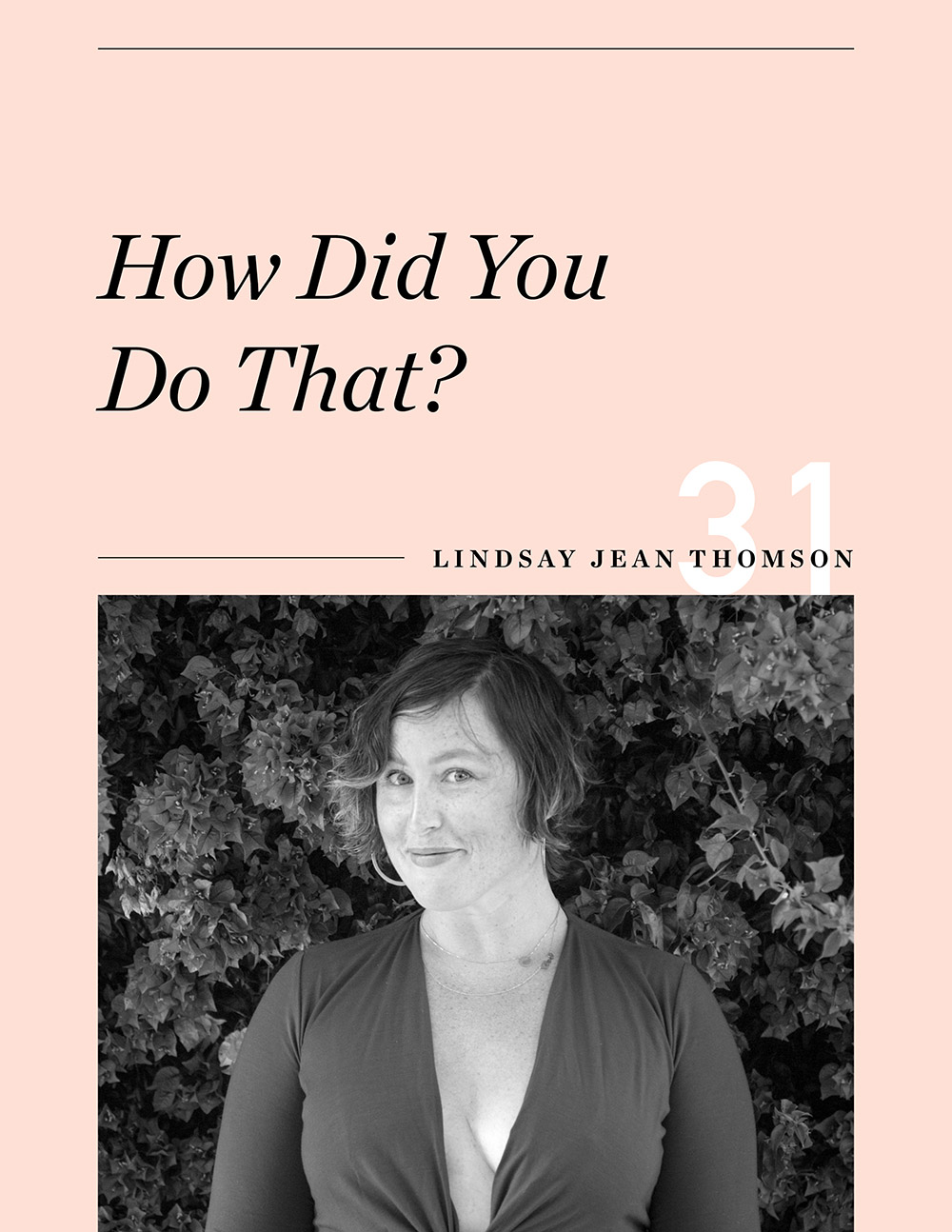
Whenever I meet someone who’s got a really cool job, who runs a thriving business, or who has completed an amazing project, I always want to know: “How did you do that?”
I’m always curious to hear the “behind-the-scenes story” — who they emailed, what they said, how they got their first client, how they got their foot in the door — the exact steps that they took to achieve their goal.
HOW DID YOU DO THAT? is an interview series where we get to hear the REAL story behind someone’s success—not the polished, neat and tidy version.
To see a complete list of all the interviews that have been completed to date, head over here.
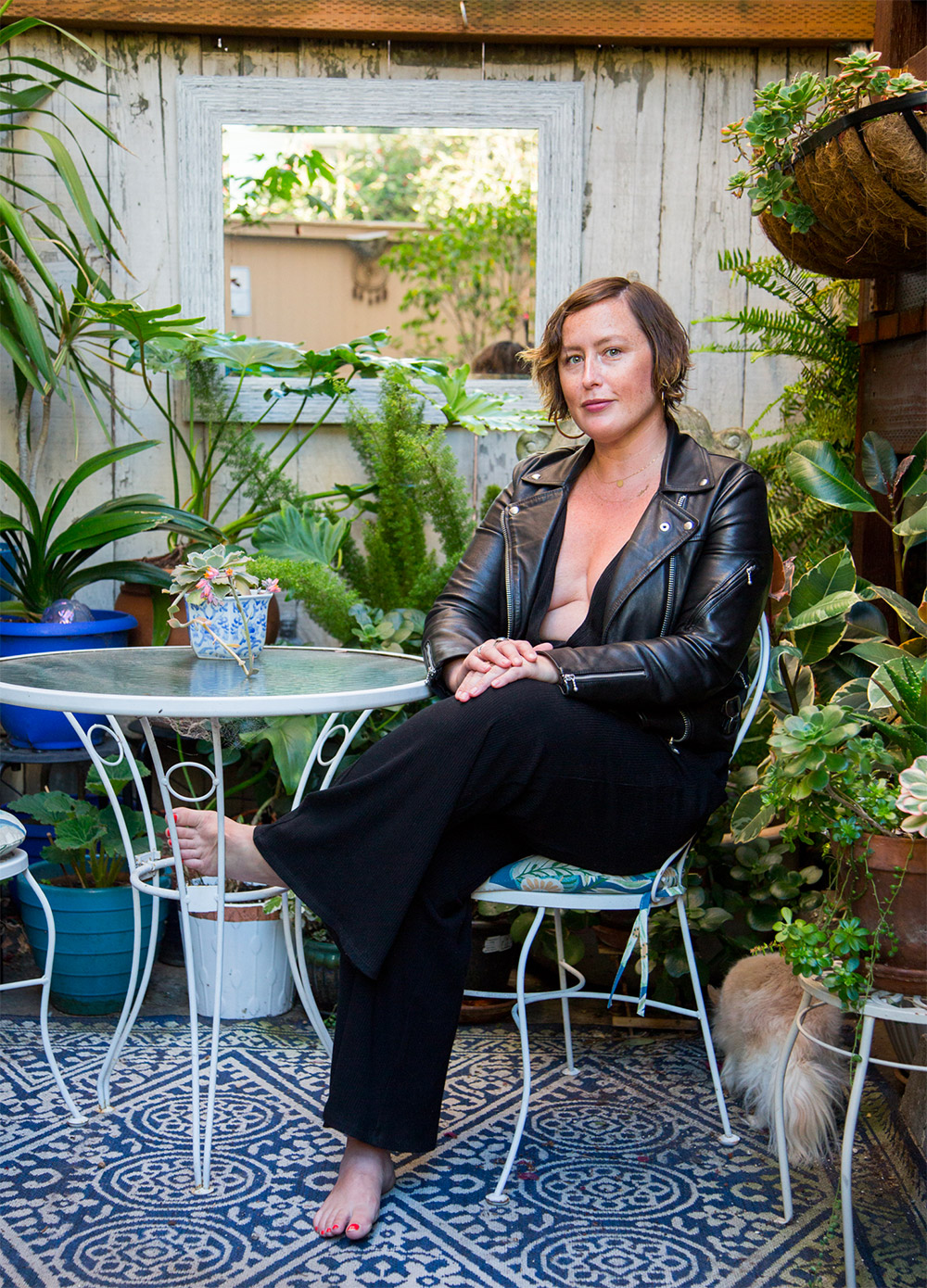
Name: Lindsay Jean Thomson
Co-founder: Women Catalysts
Breast Cancer Advocate
Co-lead: #100DayProject
San Francisco, CA
What is your background and training?
I studied English in college then worked in PR for a few years after. When I moved to San Francisco in 2008, I started my first business providing yoga and wellness programming for start-ups. A few years later, I trained as coach. I’ve done a lot of different things with that, everything from career coaching to business consulting. And then in early 2015, my best friend Kim and I started Women Catalysts.
You’re clearly a woman that loves to collaborate. Tell me, what attracts you to community building?
I’m a Cancer, the crab – I’m just naturally drawn to building homes for people.
When I was young, my friends would call me the “social activities coordinator”. I was always the person who said, “These are all of the things that are going on this week, and here’s what we should do.” On so many levels, personally and professionally, everything boils down to your connection to other people. It’s just something I’ve always innately done.
What caused you to start Women Catalysts?
Women Catalysts started as an idea that Kim and I had while flying kites and drinking beers in the park. It was seemingly out of the blue, but culturally there were some things going on and we were also meeting a lot of women who didn’t have the friendships or the professional relationships they really wanted in their lives. We decided to create a space to make that easier and more accessible.
We know so many women who are doing so many cool things that we thought it would be a lot more inspiring and motivating to create a space where women had control over their narrative, where we could talk about what was working and what wasn’t working. And in the very early days, a lot of the speakers were our friends.
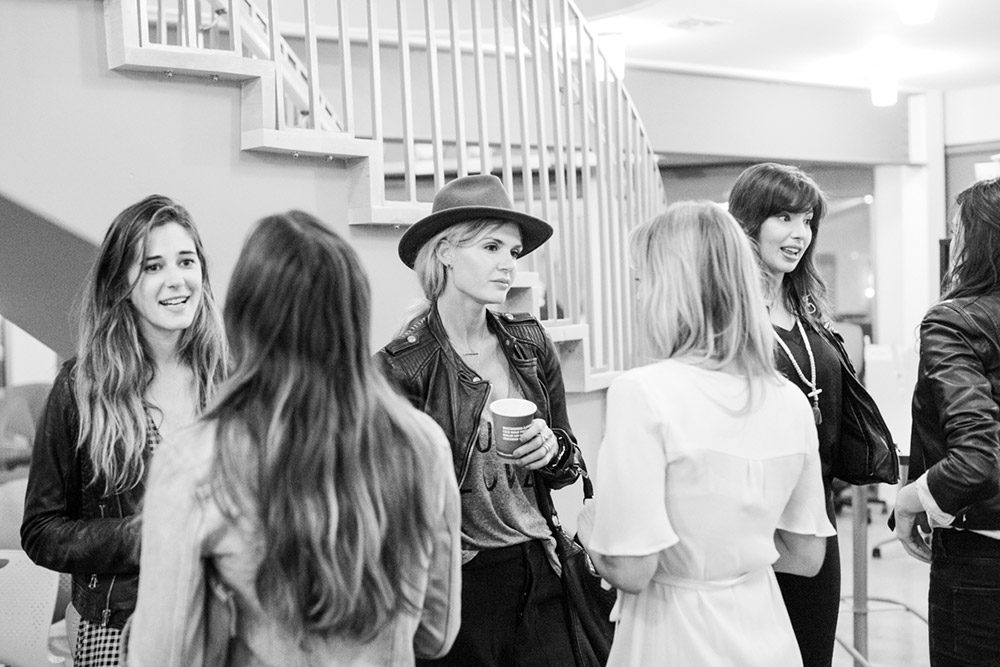
Networking is something that’s so hard for many people. Certain people love talking to people and engaging in conversations. I don’t even think of it as networking. But for a lot of people, it paralyses them. With Women Catalysts, you’ve created this really fun environment for people to interact and feel comfortable.
Who is the typical person that comes to these events? And if somebody is an introvert, is there a place for that?
I think for a lot of people, and women particularly, the transactional nature of networking is really off-putting, because relationship building is about so much more than what can you do for me and what I can do for you. I’m never looking at somebody and thinking, “What am I going to get out of this conversation?”
Any job you get, any apartment you rent, any boyfriend or girlfriend you meet, it’s never going to be because you decided that you wanted something from somebody. It’s going to be because you built a relationship with them. And so we like to think we’ve made something unique, in that we’ve created a space for people to connect in a meaningful way.
As far as introverts, I get it. One of the early inspirations for Women Catalysts was that Kim and I had gone to a networking event for founders and it wasn’t a great experience. I left that event thinking, “What would this be like if you were an introvert?”
I’m pretty comfortable talking to strangers. But for a lot of us, it’s very uncomfortable, particularly because if you’re going to a networking event you’re often in some kind of transition, and you might not know how to talk about that yet. So how do we make that easier for you and more effective?
You are a breast cancer survivor. And you chronicled your journey in 2016 on Vice. Obviously, it was a life changer for you. What has been the impact of cancer on your life and career?
I don’t even know where to start. I guess I’ll backtrack and say that one of the things I was really resentful of early on was this feeling that it would always be a thing in my life. The truth is that it is always going to be a thing in my life, but I’m no longer resentful of it. It has been an incredibly healing experience personally. It has brought me closer to my A-team, to my people. It has strengthened my community, it has helped me relate better to myself and to other people, it has made me realize how resilient I am. And it was incredibly challenging. It was a lot of things all at once.
What do you say to a woman who finds out she has breast cancer? Obviously, there’s this amazing amount of confusion and information and overwhelm, and all those things that happen when we suddenly enter the confusing world of illness and recovery. What should be the first few steps a woman should take? And is there anything that happened to you that you wish you had done differently?
I do a lot of education around breast cancer. I think it’s really helpful to get to know it better, because it’s actually very common. One in eight women in America will get diagnosed with breast cancer in their lifetime and over 40% of Americans will get diagnosed with some type of cancer in their lifetime. And for something that is so common, I think it’s really scary and not something people talk about enough. Especially if no one in your family has had it. I was one of those people. No one in my family had cancer; no one I knew had cancer. And so my only experience of it was seeing it in film and television when it’s being highly dramatized.
I educate people about what the process is like, what it’s like to go through chemo, what it’s like to do radiation, what it’s like to have a mastectomy. And also try to clear up some common misconceptions. For example, a lot of people think that if you get diagnosed with breast cancer young or “relatively young,” as my doctor likes to say, that it must run in your family. But that’s not even close to being true.
85% of women who get diagnosed don’t have a close female relative with the disease. I put off going to the doctor for a long time because on a conscious level I was telling myself, “Well, why would I have cancer?” And the reality is that anybody can get cancer at any age and it doesn’t have to be a death sentence or even close to it. Breast cancer has great survival rates. If you get diagnosed at stage zero or stage one, it’s almost a 100% survival rate relative to the general population.
As far as a woman who gets diagnosed, I would say you don’t have to decide today what you’re doing; you don’t have to decide what the outcome of this is going to be. You don’t have to be in a rush to figure out what the lesson is. You’re allowed to feel what you feel. This is an opportunity to trust yourself and your intuition. If you want do what your doctor says, cool. If you want to get 20 opinions, cool. You do whatever you want do. A lot of people are going to have a lot of ideas about what you should do, but ultimately only you get to decide that for yourself. And let people help you.
Along with everything else you do, you co-lead, along with Elle Luna, the #100DayProject. What is that and how did you get involved?
Michael Bierut, a very well known graphic designer, started it as a yearlong personal project.
Every single day he’d open up The New York Times, pick a photograph, and draw something based on the image. A couple of years later, he was teaching a course at Yale, and one of his colleagues said, “Hey, have you thought about doing that thing for your students that you did for yourself?” And oddly enough, the class started on one day and ended exactly 100 days later. So his yearlong project became a 100-Day project for his students.
Elle, who is a very dear friend of mine, had heard about the project and really wanted to do it but she wasn’t at Yale. She was talking with some of her fellow creative friends and they decided to do it themselves on Instagram. They started their own individual projects, collectively using the hashtag #The100DayProject.
#The100DayProject is a free global art experiment that anyone can do. People participate all around the world. The only parameters are to pick an action, do it every single day for 100 days, and to document the process on Instagram with the #The100DayProject and your own unique hashtag so that your posts are easy to find.
Elle has led it every year for the past five years, and I’ve co-led it with her the last two years. That collaboration came about really organically. We were brainstorming different ways to make it more fun and easier for people and we ended up putting together a group program that runs in tandem with the free public version of #The100DayProject.
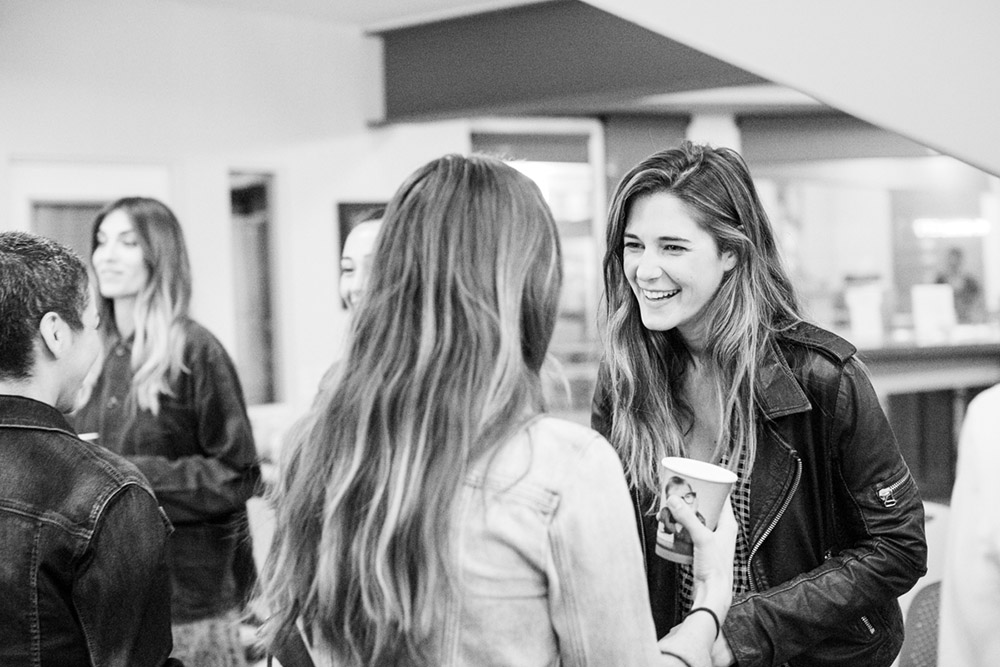
Do people find it challenging to commit and follow through on a project for 100 days?
It’s very challenging to make a commitment to yourself. We have limited time and space and resources, many of us, and unlimited pulls on our attention. And I think it’s pretty radical to make that commitment.
Elle and I have done this enough times that we know the cycles. The first day you’re kind of scared, but you’re really excited and it’s like the first day of school. And the first week, it’s like the beginning of the year.
Then you miss a day or two days and enthusiasm ebbs. It’s hard to pick it back up when you’ve missed a day. We learn to be gentle with ourselves. We learn to let ourselves be human.
How many people were in the last round?
Hard to say. There are over one million posts on Instagram with the hashtag #The100DayProject and people use other variations of it, so I would venture to guess that there’s quite a bit more than that.
What is the impact of doing a small act, not necessarily a creative act, but a small act every single day and sticking to it? How does it impact your other 265 days of your year?
I think the only way to build creative confidence is to earn it through action. That doesn’t just show up on its own. I think a lot of times people wait to do something until they feel confident enough or good enough or prepared enough, and that day never comes unless you just do it.
People get a lot of different things out of the project, and I think ultimately it’s about figuring out what the purpose is for you. Some people have an outcome that they’re aiming towards, like finishing a book or having a show or building their portfolio. And that’s great. Some people just want to get better at using a new type of brush or a new type of knitting needle. So they’re really focusing on process. Some people have no idea, and it’s revealed to them through the course of it, or it changes. It’s not uncommon for your goal to change midstream.
Ultimately, I think that there’s a lot to be learned and earned through commitment to yourself and to what matters to you. It’s actually pretty radical to take up space to say I have a right to express myself, to put it out into the world merely because you like it.
One last question. If someone is interested in building community around something that’s important to them, what are three pieces of advice that you would give them?
1. Think about how you want people to feel.
2. Think about what you want them to know or learn as a result, and
3. Think about what you want them to be motivated to do as a result of coming or participating.
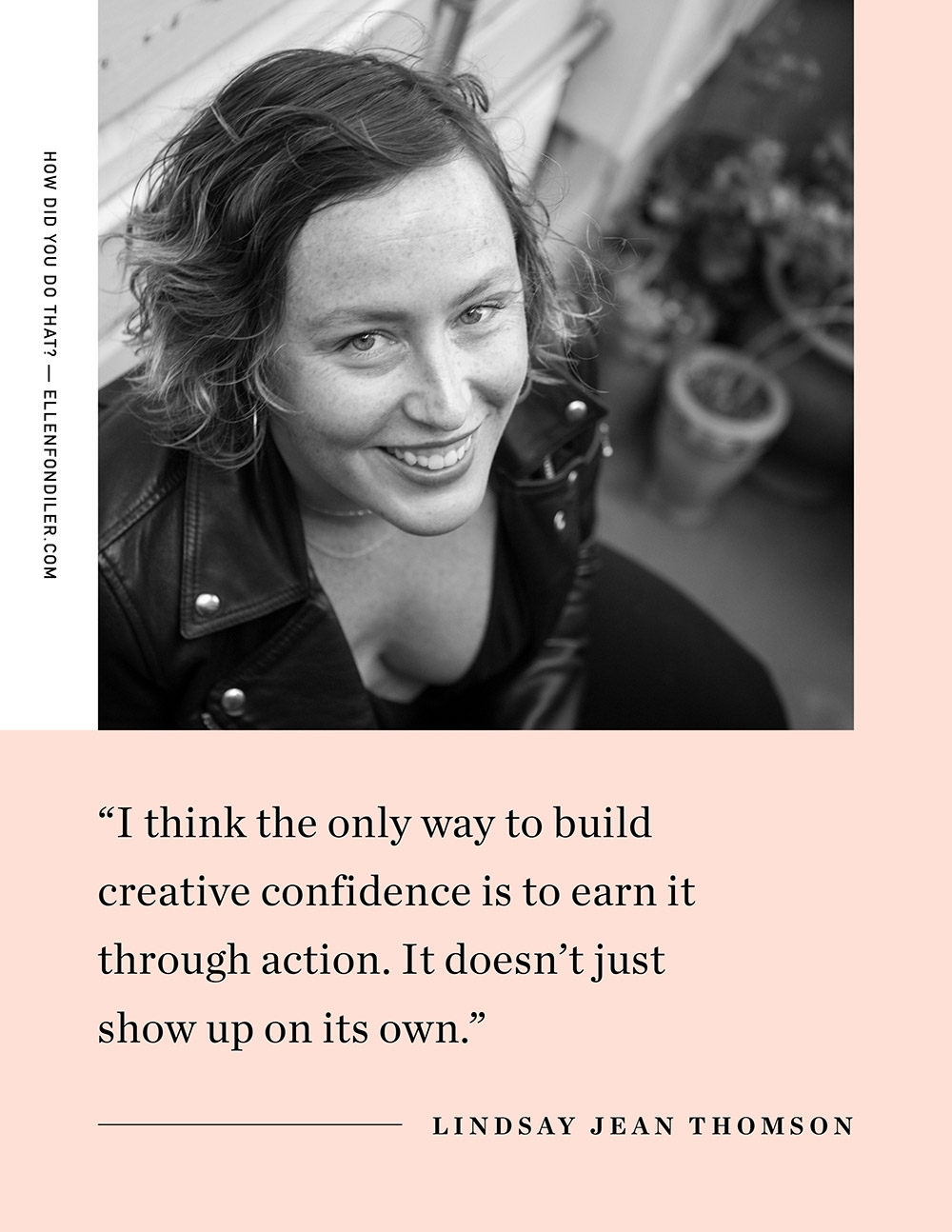
ONE MORE THING…
Do you have “one more quick question” that you’d like to ask Lindsay? Email me and tell me what you want to know! I might choose your question for my ONE MORE THING… Podcast (Coming soon!!!)
YOUR #1 CAREER GOAL: ACHIEVED
Do you need some encouragement to help you achieve a big, daunting career goal? Would you like to have a career coach/strategist in your corner—feeding you ideas that you’d never considered before, helping you figure out who to contact, and what to say, and checking in to make sure you don’t procrastinate? If so… click here to find out how we can work together. I’d love to coach you!
![]()
Photos: Christine Chang and Regina Felice Garcia.
